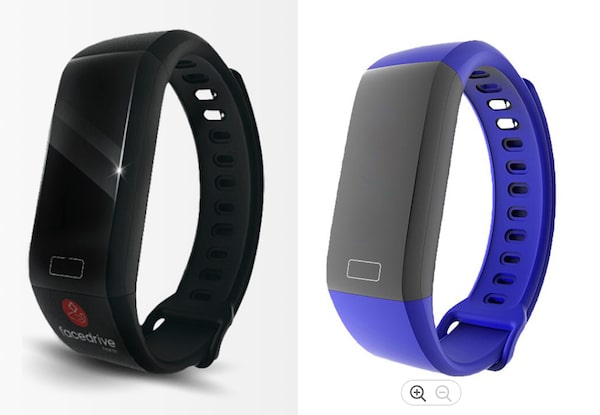
A Facedrive product, left, and a wearable tracing device by KKM, right. Invoices obtained by The Globe and Mail show now-troubled Facedrive bought more than 200,000 wearable devices from KKM Co. Ltd., a manufacturer in China that sells its products on e-commerce site Alibaba for a few dollars each.Handout
Facedrive Inc. spent millions of dollars to buy physical-distancing devices from a Chinese manufacturer, raising questions about funding it received from the Ontario government to build the wearable technology in the province.
Purchase invoices obtained by The Globe and Mail show now-troubled Facedrive bought more than 200,000 wearable devices from KKM Co. Ltd., a manufacturer in China that sells its products on e-commerce site Alibaba for a few dollars each.
In February, when the province announced it was giving $2.5-million to Toronto-based Facedrive to develop TraceSCAN, a wristwatch-like device that is supposed to help with contact tracing and physical distancing to fight COVID-19, the Progressive Conservative government touted the funding as a “made-in-Ontario solution.”
Economic Development Minister Victor Fedeli said in a promotional video that Facedrive “anticipates manufacturing 150,000 devices right here in Ontario.” But The Globe has also learned that a number of the companies that reportedly signed on to outfit their staff with TraceSCAN are no longer utilizing the devices.
Facedrive insiders sell holdings as company’s share price sink
How did Facedrive, a tiny Canadian tech startup, become a multibillion-dollar company?
The troubles with TraceSCAN are just a small part of much larger problems confronting Facedrive, which has been plagued by weak sales and a history of losses. The company, which started as a ride-hailing service and then announced expansions into several other areas – including online retail, food delivery and an electric-vehicle subscription service – has also seen its share price soar and crash on the stock market.
From about $2 on the Toronto Venture Exchange at the start of 2020, the price climbed early in the pandemic, then skyrocketed earlier this year, hitting a high of $59.95 in February. That gave Facedrive a market valuation of more than $5-billion, despite little market share in any of its business lines.
The share price has since fallen back to about $1 recently, amid growing financial losses. Company executives, and one of its co-founders, sold a substantial number of shares in the past two months, contributing to the decline.
Facedrive refers to itself as a “people-and-planet-first tech ecosystem,” and it pivoted to contact tracing in the early days of the global pandemic.
When the funding was announced in February, the Ontario Ministry of Economic Development, Job Creation and Trade said the funding would “accelerate the deployment” of TraceSCAN, which notifies users in workplaces they are too close to one another by beeping or vibrating, and logs interactions for contract tracing. “We look deep into anything that we invest in,” Premier Doug Ford said at a news conference that month when asked about the funding.
In April, The Globe noted many similarities between KKM’s devices and TraceSCAN. The invoices confirm TraceSCAN is at least partially a white-label product from China, and there is no indication Facedrive has manufactured anything in Ontario or elsewhere.
The company did not respond directly to a question about manufacturing, but said it developed the software that runs on TraceSCAN. The company previously highlighted the involvement of two University of Waterloo professors who incorporated artificial intelligence. Neither professor responded to a request for comment about their roles.
The invoices obtained by The Globe show the wearable devices were purchased by Suman Pushparajah, previously Facedrive’s chief operating officer and now its chief executive officer. Mr. Pushparajah bought some of the devices through the Firm Group, a private company of which he is the sole director, and listed his home as the shipping address.
Facedrive said in its reply to The Globe it used the Firm Group to buy the devices “because we did not want to have Facedrive’s name up-front for both pricing and competitive reasons.” Facedrive’s regulatory filings note the Firm Group has provided it with office space, operational support and marketing services.
KKM customized the devices with logos for Facedrive and LiUNA, a construction union that was an early and vocal supporter of TraceSCAN. LiUNA did not respond when asked whether its members still use the technology.
Facedrive is also behind on its targets for the provincially funded project, which it said would create 68 jobs, and said it has been granted an extension. Facedrive received $1.5-million from the government in February, and the rest of the funding was contingent on the company delivering 160,000 TraceSCAN devices by July 5.
A spokesperson for Ontario’s Ministry of Economic Development declined to comment in detail on Facedrive because of confidentiality agreements. “The final payment to the company will not be released to the company until after the province has received, reviewed and is satisfied with the completion of the project,” Sumita Kanga said.
Despite spending at least US$2.7-million to buy from KKM, according to the invoices, Facedrive has earned only $178,980 in revenue from TraceSCAN, according to the company’s financial filings.
The product faces very challenging prospects with vaccination rates climbing. Riverside Natural Foods Ltd. and Air Canada, both of which implemented TraceSCAN, said they no longer use the wearables.
“As we adopted other preventative measures and our work force got vaccinated, our safety programs evolved beyond the requirement for this technology,” Air Canada spokesperson Peter Fitzpatrick said.
TO Live, which oversees three performing arts venues in Toronto, bought 300 devices for a pilot project in the summer, but has not expanded the use of TraceSCAN since then.
Also in July, Facedrive announced an early learning school in Barbados would adopt TraceSCAN for students and staff. The school told The Globe its classes are still virtual, and it has not yet used any devices.
Meanwhile, Facedrive executives sold off millions of dollars worth of stock as the company’s share price crashed. Mr. Pushparajah sold nearly 800,000 shares in the two days after becoming CEO in September, and more than 990,000 over the following weeks, for total proceeds of $3.99-million.
Facedrive previously told The Globe Mr. Pushparajah had received a “limited salary” since joining the company in 2018, and wanted to ensure “having adequate personal liquidity as the company entered the next stages of its long-term growth plan.”
Sayan Navaratnam, Facedrive’s former CEO and board chair, has sold $8.5-million worth of shares since stepping down in September, while a numbered company he controls unloaded shares worth $5.3-million.
Imran Khan, a co-founder who no longer has a role in the company, sold at least $8.7-million worth of shares.
Your time is valuable. Have the Top Business Headlines newsletter conveniently delivered to your inbox in the morning or evening. Sign up today.
 Joe Castaldo
Joe Castaldo Greg McArthur
Greg McArthur